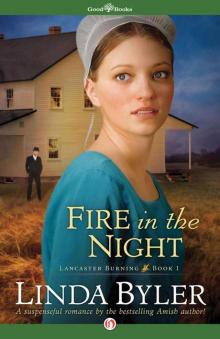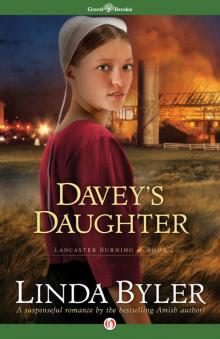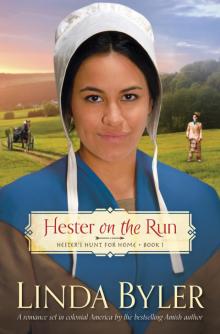- Home
- Linda Byler
Hester on the Run Page 15
Hester on the Run Read online
Page 15
Baby Emma toddled through the water that had pooled around the clothes, where bits of wood chips, straw, and ashes were turning dark as the water ran in little rivulets.
Grabbing a piece of heavy toweling, Hester swiped at the puddles, then opened the door to shake out the wood chips. For only a moment, she breathed deeply the gray-white purity of the snow and the storm. Bits of snow and ice hit her brown face, but she lifted her eyes, reveling in the cold and startling power of the wind.
Behind her, Solomon coughed a rasping croak, followed by a whine for vossa, vossa (water). A sharp reprimand from Hans followed. When she turned, after settling the latch securely, she felt his dark eyes on her, angry and displeased. Keeping her head low, her face averted, she brought Solomon a drink of good cold water from the springhouse. She patted his shoulder as he lay back, his blue eyes so much like Kate’s, watching her face intently.
“Why did you stand there with the door open, letting in all that cold?” Hans asked.
Hester chose not to answer him. Whatever her reply was, it would be the wrong one, she knew.
“Answer me.”
“I was watching the storm.”
“And letting in the cold.”
“Yes.”
“You’re old enough to know better.”
“Yes.”
It was the answer he wanted. Total servitude. Absolute obedience. Compliance. A deep bowing to his will. When she acknowledged her own stupidity, he was satisfied. Anything else would only have been met with more sparring, a hopeless exchange of words, gone awry without a smidgen of common sense.
And so he brooded, staring into the fire, lifting his eyes only momentarily to absorb the one thing that kept him grounded, his appreciation of Hester’s beauty. For he still loved her as he had loved the young Indian child. Only now he was intimidated by her. She was growing away from him, and the experience left him rife with hopelessness, inadequate and afraid.
She moved about the room like a princess. Her figure was tall and perfectly proportioned, her neck long and slender, her face a display of emotion as she bent over Barbara with her long, slender fingers, healing, soothing. Her eyes were large with a fringe of heavy lashes shading them. Her eyebrows were like the wing of a raven in the distance. Her nose was small and straight but wide at the top, built out between the perfection of her eyes, different from the Swiss and German faces Hans was accustomed to. Her mouth was full, wide, and in absolute symmetry with her eyes, the chin beneath small and round.
He needed to speak to her of her soul. In a year or so, she would be expected to become a member of the church. How could she, if he was certain she couldn’t read very much? How much did she really understand? This weighed heavily on Hans’s heart, as the storm blew itself out, leaving the sky blue for only a short period of time. The wind returned in an awesome display of furious clouds, spewing forth a blast of frigid winds that gathered in the north and swept over Pennsylvania.
The sturdy log house shook and shivered in the winds’ power. The gray shake shingles tore loose on the barn, and snow sifted down onto the backs of the animals, melting slowly, marking their hides with dark streaks. Hester set wooden buckets when yet another drip appeared in the house, until Hans roused himself and set about making more shingles. He placed a ladder against both buildings and set their roofs to rights.
When Hester overcooked the dried beans, leaving the soup thick and mushy and the bread a paste, he let her know in soft-spoken tones that she had better be more watchful of the time when she set the beans to soak.
She agreed, her eyes hooded, giving nothing away. When the bread was not kneaded long enough, he mentioned it immediately. When it crumbled away from the freshly churned butter, he did not hesitate to speak of it as well.
Hester didn’t always understand the ways of bread. Sometimes she could knead the heavy brown dough until her shoulders ached, and it would not rise or turn out light and spongy. Other times, she gave it a few good rolls, patted it, put it to rise, and it turned out light and chewy, in perfect harmony with the tasty butter. But she said nothing to Hans, only to Lissie, who looked up from the sock she was darning, her blue eyes sizzling with indignation, and said if Dat didn’t like his bread the way Hester made it, then she guessed he needed to make it himself. Hester laughed out loud, a sound heard infrequently. She relished the thought of Hans bent over the dough tray, kneading and kneading, the bread crumbling away at the touch of the butter knife.
The children regained their health, the storm blew itself out, and Hans left the house to change a few of the box stalls in the barn.
When spring arrived that year, hearts everywhere celebrated. Housewives sang joyously, and men walking behind their plows watched rolls of fertile soil turn over and whistled praises.
Swallows wheeled in the sunshine. The air was heavy with the scent of honeysuckle vines and wild strawberry blossoms. The grass grew thick, the sheep and cows gorged themselves on the tender new growth, becoming fat and contented. The cows’ udders bulged with new milk, and Hester made butter. She packed the excess away, and Hans took it to the trading post to sell, coming home with coins weighing down his pockets. He emptied them furtively into the redware cup by the fireplace.
Hester also collected buttermilk, which she set in the springhouse to keep cold. Now and then, when more had accumulated than she could use, they sold it, too.
When the hens occasionally laid more than usual, and the family could spare some eggs, Hans sold them by the dozen at an exorbitant price.
The gray mare produced a fine colt—a bay foal—which had its mother’s fine, long legs. This fine animal lifted Hans’s spirits to a higher level than they had ever been since his beloved Kate’s death.
Hester laughed aloud at the antics of the new calves and chased them about the pasture. She gathered great armloads of wild iris and honeysuckle and fitted them into earthenware bowls, filling the log house with a scent that was unmatched by anything Hans had ever smelled.
It evoked a sadness in him, an unnamed longing for someone to call his own. He would need a wife in the future, a mother for his children, a helpmeet to share his life. The thought terrified him and made him feel very small and ashamed of who he was. Only a man, with nine children, no, ten, counting Hester. Who would be willing to give him her hand?
CHAPTER 14
EVER SINCE THE LOCAL SCHOOL HAD RESUMED IN March, Theodore Crane was dreadfully behind with the year’s lessons. His stomach soured from his nervous tics, and his eyebrows jumped unceasingly as he passed about the classroom like a caged lion.
When a line of children stood side by side in the front of the room to read from their small, hardcovered readers, he tipped forward and backward so fast, Noah’s eyes widened to Isaac, and he jerked a thumb in the schoolmaster’s direction. Isaac bent his head behind his slate, desperately striving to keep a straight face.
Theodore called a school meeting for the parents and asked for any available volunteers as tutors to help the little ones with their work, a plan that seemed excellent to him at the time. When Lissie Hershberger volunteered, raising an ample, well-rounded arm and stating her eagerness to help, he floundered like a catfish caught on a hook. What a woman.
Anyone, simply anyone else, would be fine, but not Lissie. He turned his head very slowly at the meeting and acknowledged her raised hand with one shaggy, gray eyebrow climbing halfway up his forehead, the other one refusing to move.
“Yes. I believe you are Elizabeth Hershberger. Is that correct?”
“Yes. You can call me Lissie. I would be willing to help three days a week in the afternoons.” Her voice was low and rich; it carried well across the room.
Theodore pulled on his Adam’s apple with his thumb and forefinger, adjusted his stiff, white collar, and cleared his throat in a rattling fashion before blinking two or three times.
“Ah, yes. Elizabeth. I believe I can …”
Here he broke off with a terrible coughing spasm, lifted his right leg, fished around in
his pocket for a clean handkerchief, and proceeded to finish coughing into it.
“I do beg your pardon.”
The occupants of the room were unsure exactly whose pardon he was begging, so ripples of acknowledgment spilled across the many faces.
Lissie, however, believed he was speaking solely to her and replied loudly, “You are so pardoned.”
Theodore felt as if he had been led to his own execution, with his fate changed by Lissie Hershberger, but he coughed a while longer to erase all that.
“Yes, yes, Elizabeth, I accept your kind offer. I thank you very much.”
He felt like a traitor, untrue to his own heart, but he could not bear to hurt the lady. She was a hard worker and sincere, and he was also quite sure she had a good head on her shoulders.
But my, she was so large. It seemed as if those yards and yards of fabric gathered across her bounteous hips would scrape the smaller children right out of their seats. She was like a great ship plowing steadily through the sea, her sails all unfurled. It was a bit frightening.
The evening closed with a discussion about the older boys’ behavior. They were almost never on time in the morning, or they loitered unnecessarily at the end of the school day. Comments came from one of the boys’ parents and then another and another. Finally, they voted unanimously to discipline their children to try to make his workload easier. They agreed there were only six more weeks of school and much to be done in that short period of time.
And so it was that Lissie drove her well-fed, old horse down the road through the lush green forest to school. The shoulders of her cape came well down the sides of her arms, and the cape was pinned closely and modestly around her neck. Her cap was white as snow and pulled well forward over her thick ears. She parted her graying hair severely in the middle, and then greased it back in a small roll along each side of her forehead. Below the sleek sheen of her graying hair, her blue eyes sparkled in anticipation.
Here was a challenge, something new. Hadn’t she changed enough diapers and swept enough dirty houses? Hadn’t she slaved over stinking farmknee breeches soaking in lukewarm wash water when the soap no longer formed decent bubbles, with her arms too tired to stir or pound the dirt out properly?
She’d tended to ailing mothers and screaming babies, comforted the dying and smacked the newborns’ backsides. She’d cared for her own husband and children besides, and then lived through the shock of his death and the deaths of two of her children.
She thought it was time for a change, so she took great care with her appearance. She turned this way to catch the light on her forehead, then another way to see that her covering was just so.
Yet, she still owned some snap, so she did. She deemed herself quite agreeable, perhaps even charming.
Theodore opened the door at her knock, stepped aside—very far aside—and ushered her into the schoolroom. She sailed through with the light, quick step of a much younger person, smiled at him, and said, “Good afternoon, Theodore.”
“Good afternoon, Elizabeth.”
He showed her the classes she would have and introduced her to the first-, second-, and third-graders who smiled guilelessly, genuinely happy to have Lissie Hershberger for their teacher. Everyone knew Lissie. She’d been to all their homes many times.
Theodore watched from his vantage point in the back of the room as Lissie launched into her first assignment, explaining multiplication to the third graders, German alphabet to the second, addition with three numbers to the first. She was thorough, well spoken, and patient. She smiled often, encouraged the slackers, never intimidated by the strongest.
However, when the last pupil ran yelling out the door, she lingered, exactly what he was afraid of. He wanted nothing to do with this outsized Amish widow. It was only his impeccable English manners that kept him from telling her so.
She spoke only of the children—who was capable, who was lagging behind. It seemed she knew each household intimately, knew what the problem was if a child seemed insecure.
He was beginning to fidget, thinking of his chores at home in the small brown house by the trading post not quite six miles away. He was hungry. He had stuffed only a portion of cold corn pone in his haversack that morning.
Lissie heaved herself to her feet, the yards of fabric swishing—why did he always think of a ship?—smiled up at him, and said she’d made ginger cookies. “I brought you some in a bag.”
She sailed through the door and across the schoolyard to her wagon, bent to retrieve the cookies from beneath the seat and sailed back, her wide face radiating happiness. “Ginger cookies.”
He opened the cloth sack immediately and came out with the largest, thickest ginger cookie he’d ever seen. It was like a small, round cake, dusted liberally with sugar and ginger. The first bite was ambrosia, chewy, soft, and fragrant with spices. He closed his eyes and chewed appreciatively, his eyebrows jiggling with the movement of his jaw.
Lissie watched him, waiting eagerly.
“The best,” he said simply.
“Thank you,” she answered, turned lightly on her heel, went to her wagon, untied the old horse, and was gone.
He should have offered to help, but he was too busy stuffing ginger cookies into his mouth. Besides, he was glad she had left.
Lissie rode home in the late afternoon sunlight and thought that Theodore Crane was just a bit schnuck (cute), the way his eyes came alive when he spoke.
But he was English, perhaps a Catholic or a Protestant, so that meant he was quite worldly, and likely she’d not be able to think of him as a potential husband with the difference in religion.
Her golden years stretched before her, bereft of a close relationship with a husband, something she had cherished, nurtured, and appreciated. She liked to set a good table, cook wonderful meals, try different recipes, loving to see a man eat.
Ach well, he was very English. He couldn’t even say Lissie. It came out “Elizabeth.”
As different as day and night.
Noah was the first to notice. He told Hester that Lissie Hershberger dressed awful particular to teach school. Hester said teachers were expected to dress in Sunday clothes, and Noah said it wasn’t just her clothes, it was the way she seemed to watch the schoolmaster with a bright face or something like that.
Hester shrugged her shoulders, and went back to the butter churn, lifting the dasher, plunging it up and down, the muscles in her young, brown hands tireless. Now that Lissie had taken the job of tutoring, Hester was on her own. Hans was a big help with the garden and the planting, and he put the boys to work as well, helping carry wood and water, hoe the garden, and perform any chore that saved Hester’s endless hard work.
She had little time to spare. Forbidden to ride her horse, she had no other activity to think about, so she became a young mother years before her time.
All that mattered to Hester was being able to feed everyone and keep the laundry done and the house decently clean.
The sewing, however, was another matter. She could sew strips of cloth by hand with tiny stitches, but she had no idea how to go about sewing a dress or shirt or pair of knee breeches.
All the boys’ knee breeches were much too short, and she had applied patches to them over and over. Sewing the patches on with firm, necessary stitches, Hester had whipped the needle in and out, her mouth set in a determined line.
They all needed clothes to wear. Without Kate, where should she begin? Noah’s and Isaac’s knee breeches were creeping up their legs, but no one thought anything of it. Lots of boys wore their breeches short, before they were handed down to the next younger brother. But Hester knew something needed to be done before school started in the fall.
She approached Hans, finally, when the spring warmth had turned to summer’s heat, when the corn was already knee-high and the hay was ready to be cut. It was late, after the children were all in bed. Hans noticed Hester’s reluctance to retire for the night, so he sat watching her. She folded a small coverlet and put it acros
s the back of the rocking chair, then picked up a few playthings and placed them in the basket by the fireplace. She stooped to pick up a washcloth someone had left on the bench, folded it across the wooden rack by the dry sink, her back turned, straight and still, for too long.
She was not wearing a cap again, and here she was, fifteen years of age. Hans knew the matter needed to be addressed.
“Hester.” The voice was not unkind. But it was authoritative, jolting.
“Yes.” Hester’s voice squeaked, and she stammered a bit.
“Why aren’t you wearing a cap?”
“I don’t like them.”
“But you were taught to wear a cap in the manner of our people.”
“Yes.”
“Then not liking it is no reason, when the ordnung of the church requires it.”
“Yes.”
“You must give yourself up as Christ did, dying for our sins. Do you think that was easy for him, our Lord and Savior?”
“No.”
“Then wearing a cap is a small thing, is that not so?”
“Yes.”
“Then you must begin to wear it.”
“I have only one, my Sunday one.”
“Who knows how to go about getting fabric? Or making it?”
Hester shrugged, her eyes lowered.
“I’ll speak to my mother,” Hans offered. “You might also want to consider more sewing. All the boys need knee breeches and shirts. The girls need dresses.”
Suddenly Hans’s face became very soft, his eyes warm and moist. “Ah, yes, Hester. That was the joy of my life when you were small—buying the fabric to make little dresses. Colors of wild roses, the blue of cornflowers. You were like a colorful little fairy.”
Hester lifted her eyes, surprised to find the emotion that memory brought to his face.
Hans met her gaze.
Hester looked away, uncomfortable, now.
As quickly, Hans said gruffly, “So, you’ll promise me you’ll wear a cap?”
“If I have one.”
The truth was, she hated to wear a cap while she worked. They were big, and the strings tied below her chin were itchy and warm in summer. Besides, what was the point? If she said that to Hans, he would never get over her flagrant display of rebellion, so she dusted the corner of the table with the tip of her apron, a movement so graceful it reminded Hans of a dancer he had watched as a young man in Switzerland.

 A Second Chance
A Second Chance Lizzie's Carefree Years
Lizzie's Carefree Years The More the Merrier
The More the Merrier Love in Unlikely Places
Love in Unlikely Places Running Around (and Such)
Running Around (and Such) Wild Horses
Wild Horses Lizzie Searches for Love Trilogy
Lizzie Searches for Love Trilogy Lizzie and Emma
Lizzie and Emma Little Amish Matchmaker
Little Amish Matchmaker The Witnesses
The Witnesses The Healing
The Healing Home Is Where the Heart Is
Home Is Where the Heart Is Fire in the Night
Fire in the Night When Strawberries Bloom
When Strawberries Bloom Little Amish Lizzie
Little Amish Lizzie Which Way Home?
Which Way Home? The Homestead
The Homestead Sadie’s Montana Trilogy
Sadie’s Montana Trilogy Davey's Daughter
Davey's Daughter Hester on the Run
Hester on the Run Disappearances
Disappearances Big Decisions
Big Decisions Becky Meets Her Match
Becky Meets Her Match Hope on the Plains
Hope on the Plains Christmas Visitor
Christmas Visitor